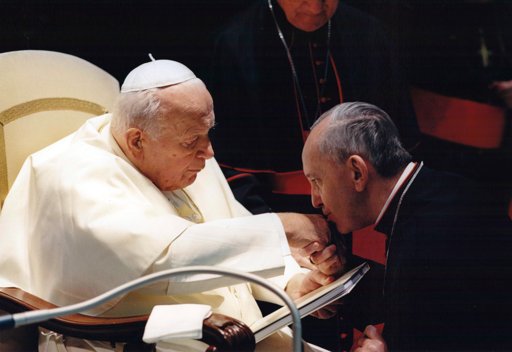
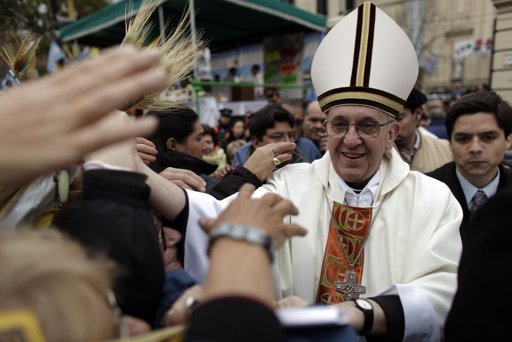
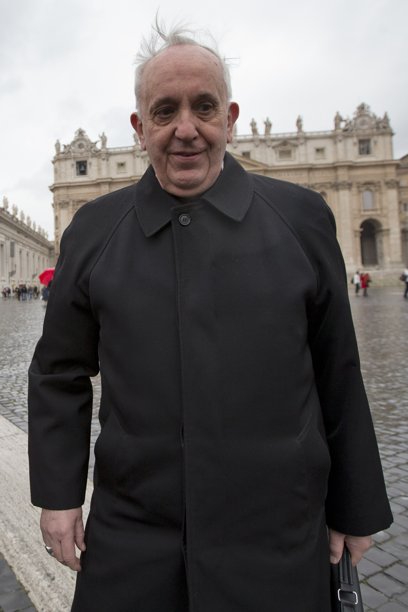
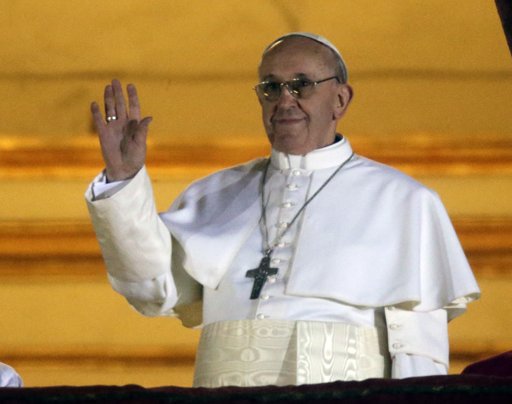
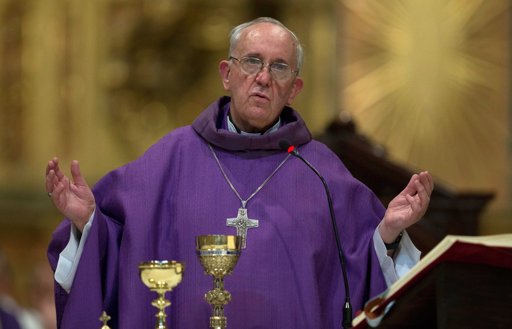
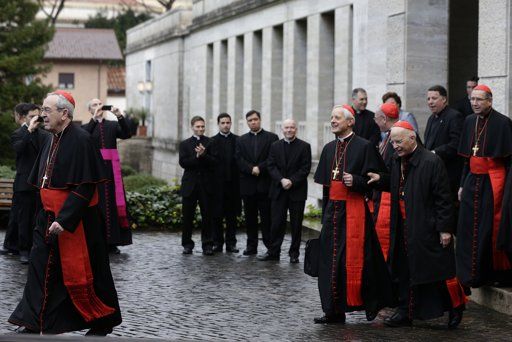
From Wikipedia, the free encyclopy
Jorge Mario Bergoglio, SJ (born December 17, 1936) is the current pope of the Roman Catholic Church, elected on March 13, 2013, and taking the regnal name of Francis., after St. Francis of Assisi [1]
Prior to his election, he served as an Argentine cardinal of the Roman Catholic Church. He has served as the Archbishop of Buenos Aires since 1998. He was elevated to the cardinalate in 2001.
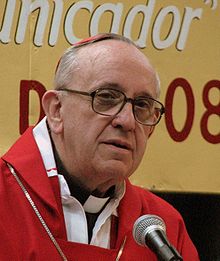
Pope Francis I: Another Humble Man Named Francis Called to Rebuild the Church
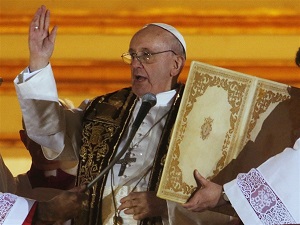
VATICAN CITY (Catholic Online) – At 7:07 p.m. in Italy, the white smoke billowed from the Chimney to a world waiting the good news. At 7:18 p.m. the bells made it clear, lest there were any lingering doubts as to whether the smoke was really white. The bells were nearly drowned out by the joyous shouts of the massive crowd who knew God had heard the prayers of His people.
Exuberance filled the air in that historic square. Its timbre reassured millions who heard it over media points of entry around the entire world. The message was for all men and women, "Habemus Papem! We Have a Pope!"
Numerous reports were quickly filed upon the arrival of the smoke. They offered more speculation. For example, the notion that the culmination of five ballots of votes from the Cardinal electors was due to the crisis the Church faces. Others expressed concern as to whether a new Pope could help to heal a troubled church. Whether sincere or not, they really missed the moment.
None of that concern was present in the faces of young and the old gathered in St. Peter’s Square. Rather, joy and hope moved them to tears and smiles. They knew the mystery which only living faith can reveal. The promise of the Lord to Peter is reliable.
That promise also applies to his successor, "You are Peter and on this Rock I will build my Church and the gates of Hell will not prevail against it." (Matt. 16:18) In fact, prior to coming forward, the new Pope had just participated in a service with the cardinals who elected him where that very promise from Matthews Gospel was read.
The Proto Deacon, French Cardinal Jean-Louis Tauran Cardinal Deacon stepped out on the central balcony of Saint Peter’s Basilica and proclaimed "Habemus Papem". He told a waiting world of the election of the 265th Successor of Saint Peter, an Argentinian Cardinal named Jorge Mario Bergoglio, S.J. The surprise I felt was evident in the faces of the commentators! Their well prepared scripts had to be discarded. Another surprise of the Spirit!
Shortly afterward Pope Francis I, clothed in papal white – without the winter red mozetta which often accompanies the papal vestments- emerged to greet the faithful. He was born on December 17, 1936, in Buenos Aries, Argentina, the son of an Italian immigrant father and an Argentinean mother. He has four brothers and sisters. He is the first Jesuit pope in history and the first to take the name of Francis.
He is known to be a humble man. In fact, among the many things heard in the immediate remarks from those who did know him was that he "rides the bus." That humility was obvious in his demeanor. I quickly discovered that he had taken as his motto for his service as a Bishop, "miserando atque eligendo" which means, lowly, and yet chosen.
With self deprecating humor he told the crowd that it looked like his brothers the Cardinals "went to the end of the world" to find him. Then, he asked the faithful to join him in prayer for His Holiness Benedict XVI. He led the crowd, and the world which was watching, in the simple recitation of the Our Father, the Hail Mary and the Glory Be.
Then, Pope Francis I did something which astounded me. He asked the faithful that – before he gave them the Urbi et Orbi Apostolic blessing – he asked them to pray for him. He bowed before those assembled in the square during a moment of silence. That was profoundly moving and, I suggest, telling.
As with all Popes, the choice of the name is significant. Though we await a full explanation as to why he chose Francis I, my heart and mind leapt to an obvious conclusion. He took the name of the little poor man of Assissi, Francis. The one to whom the Lord had appeared and said "Go and Rebuild my Church which you can see is falling down in ruins."
That humble deacon named Francis Bernadone did what the Lord asked him in the thirteenth century. As a result, both the Church and the world were changed. The Church of Francis of Assisi’s time was not unlike the Church which Pope Francis I will serve. The world of Francis of Assisi’s time was not unlike the world into which Pope Francis I is called to bring the message of the Gospel in its fullness.
The Lord uses holy and humble men at critical times in Church history to bring authentic renewal. May the Pope who bears the name of Francis exhibit the humility, deep prayer and level of spiritual gifts which his namesake offered at another critical time in the history of the Church and the world.
In the days ahead we will hear much more about Pope Francis I. The media is already filled with people parsing his theological training and looking for "clues" as to how he will exercise his office. His association with the movement Communion and Liberation, his theological orthodoxy and his love for the poor have all been mentioned. They are encouraging to me.
There will be plenty of time for all of that. We will certainly join in. However, as for this moment, I ask our readers around the globe to pray for our Pope, Francis I. Then, take his first direction which he gave after the Blessing when he grabbed the microphone spontaneously and spoke again to the crowd, "Have a good evening and rest well." The Church of Jesus Christ is in good hands.
Who is Pope Francis I
LoS ANGELES, CA (Catholic Online) – Born in Buenos Aires, Bergoglio was one of the five children of an Italian railway worker and his wife. After studying at the seminary in Villa Devoto, he entered the Society of Jesus in 1958. Bergoglio taught literature and psychology at the Colegio de la Inmaculada in Santa Fe, and the Colegio del Salvador in Buenos Aires. He was ordained to the priesthood on December 13, 1969, by Archbishop Ramón José Castellano. Bergoglio attained the position of novice master there and became professor of theology.
The Society of Jesus, impressed with his leadership skills, promoted Bergoglio where he served as provincial for Argentina from 1973 to 1979.
He then transferred in 1980 to become the rector of the seminary in San Miguel where had had studied, serving in that capacity until 1986. He completed his doctoral dissertation in Germany and returned to his homeland to serve as confessor and spiritual director in Córdoba.
Bergoglio succeeded Cardinal Quarracino on February 28, 1998. He was concurrently named ordinary for Eastern Catholics in Argentina, who lacked their own prelate. Pope John Paul II summoned the newly named archbishop to the consistory of February 21, 2001 in Vatican City and elevated Bergoglio with the papal honors of a cardinal. He was named to the Cardinal-Priest of Saint Robert Bellarmino.
As cardinal, Bergoglio was appointed to several administrative positions in the Roman Curia. He served on the Congregation of Clergy, Congregation of Divine Worship and Sacraments, Congregation of Institutes of Consecrated Life and the Congregation of Societies of Apostolic Life. Bergoglio became a member of the Commission on Latin American and the Family Council.
As Cardinal, Bergoglio became known for personal humility, doctrinal conservatism and a commitment to social justice. A simple lifestyle has contributed to his reputation for humility. Living in a small apartment, he eschews the typical palatial bishop\’s residence. He gave up his chauffeured limousine in favor of public transportation, and reportedly cooks his own meals.
Upon the death of Pope John Paul II, Bergoglio, considered papabile himself, participated in the 2005 papal conclave as a cardinal elector, the conclave that selected Pope Benedict XVI.
In November 8, 2005, Bergoglio was elected President of the Argentine Episcopal Conference for a three-year term (2005-2008) by a large majority of the Argentine bishops, which according to reports confirms his local leadership and the international prestige earned by his alleged performance in the conclave. He was reelected on November 11, 2008.
Bergoglio is an accomplished theologian who distanced himself from liberation theology early in his career. He is thought to be close to Comunione e Liberazione, a conservative lay movement.
Cardinal Bergoglio has invited his clergy and laity to oppose both abortion and euthanasia.
Among his many edicts, he has affirmed church teaching on homosexuality, though he teaches the importance of respecting individuals who are homosexual. He strongly opposed legislation introduced in 2010 by the Argentine Government to allow same-sex marriage. He has also insisted that adoption by homosexuals is a form of discrimination against children.
His doctrinal orthodoxy emphasizes Christ\’s mandate to love: he is well remembered for his 2001 visit to a hospice, in which he washed and kissed the feet of twelve AIDS patients.
His tenure has been marked with controversy. On April 15, 2005, a human rights lawyer filed a criminal complaint against Bergoglio, accusing him of conspiring with the junta in 1976 to kidnap two Jesuit priests, whom he, as superior of the Society of Jesus of Argentina in 1976, had asked to leave their pastoral work following conflict within the Society over how to respond to the new military dictatorship, with some priests advocating a violent overthrow. Bergoglio\’s spokesman has flatly denied the allegations. No evidence was presented linking the cardinal to this crime.
Early life
Jorge Bergoglio was born in Buenos Aires, one of the five children of an Italian railway worker and his wife. After studying at the seminary in Villa Devoto, he entered the Society of Jesus on March 11, 1958. Bergoglio obtained a licentiate in philosophy from the Colegio Máximo San José in San Miguel, and then taught literature and psychology at the Colegio de la Inmaculada in Santa Fe, and the Colegio del Salvador in Buenos Aires. He was ordained to the priesthood on December 13, 1969, by Archbishop Ramón José Castellano. He attended the Philosophical and Theological Faculty of San Miguel, a seminary in San Miguel. Bergoglio attained the position of novice master there and became professor of theology.
Impressed with his leadership skills, the Society of Jesus promoted Bergoglio and he served as provincial for Argentina from 1973 to 1979. He was transferred in 1980 to become the rector of the seminary in San Miguel where had had studied. He served in that capacity until 1986. He completed his doctoral dissertation in Germany and returned to his homeland to serve as confessor and spiritual director in Córdoba.
| Styles of Jorge Mario Bergoglio |
|
|---|---|
 |
|
| Reference style | His Holiness |
| Spoken style | Your Holiness |
| Informal style | Cardinal |
| See | Buenos Aires |
Bergoglio succeeded Cardinal Quarracino on February 28, 1998. He was concurrently named ordinary for Eastern Catholics in Argentina, who lacked their own prelate. Pope John Paul II summoned the newly named archbishop to the consistory of February 21, 2001 in Vatican City and elevated Bergoglio with the papal honors of a cardinal. He was named to the Cardinal-Priest of Saint Robert Bellarmino.
Cardinal

Jorge Cardinal Bergoglio greets President Cristina Fernández de Kirchner, December, 2007.
As cardinal, Bergoglio was appointed to several administrative positions in the Roman Curia. He served on the Congregation of Clergy, Congregation of Divine Worship and Sacraments, Congregation of Institutes of Consecrated Life and the Congregation of Societies of Apostolic Life. Bergoglio became a member of the Commission on Latin American and the Family Council.
As Cardinal, Bergoglio became known for personal humility, doctrinal conservatism and a commitment to social justice. A simple lifestyle has contributed to his reputation for humility. He lives in a small apartment, rather than in the palatial bishop’s residence. He gave up his chauffeured limousine in favor of public transportation, and he reportedly cooks his own meals.
Upon the death of Pope John Paul II, Bergoglio, considered papabile himself, participated in the 2005 papal conclave as a cardinal elector, the conclave that selected Pope Benedict XVI. A widespread theory says that he was in a tight fight with Ratzinger until he himself adviced crying[clarification needed] not to be voted.[2] Earlier, he had participated in the funeral of Pope John Paul II and acted as a regent alongside the College of Cardinals, governing the Holy See and the Roman Catholic Church during the interregnum sede vacante period. Cardinal Bergoglio remains eligible to participate in conclaves that begin before his 80th birthday on December 17, 2016.
During the 2005 Synod of Bishops, he was elected a member of the Post-Synodal council. Catholic journalist John L. Allen, Jr. reported that Bergoglio was a frontrunner in the 2005 Conclave. An unauthorized diary of uncertain authenticity released in September 2005[3] confirmed that Bergogolio was the runner-up and main challenger of Cardinal Ratzinger at that conclave. The purported diary of the anonymous cardinal claimed Bergoglio received 40 votes in the third ballot, but fell back to 26 at the fourth and decisive ballot.
On November 8, 2005, Bergoglio was elected President of the Argentine Episcopal Conference for a three-year term (2005–2008) by a large majority of the Argentine bishops, which according to reports confirms his local leadership and the international prestige earned by his alleged performance in the conclave. He was reelected on November 11, 2008.
Pope Francis I
Cardinal Bergoglio was elected Pope Francis I by the Papal_conclave,_2013.[4]
Views
Liberation theology
Bergoglio is an accomplished theologian who distanced himself from liberation theology early in his career. He is thought to be close to Comunione e Liberazione, a conservative lay movement.
Abortion and euthanasia
Cardinal Bergoglio has invited his clergy and laity to oppose both abortion and euthanasia.[5]
Homosexuality
He has affirmed church teaching on homosexuality, though he teaches the importance of respecting individuals who are homosexual. He strongly opposed legislation introduced in 2010 by the Argentine Government to allow same-sex marriage. In a letter to the monasteries of Buenos Aires, he wrote: "Let’s not be naive, we’re not talking about a simple political battle; it is a destructive pretension against the plan of God. We are not talking about a mere bill, but rather a machination of the Father of Lies that seeks to confuse and deceive the children of God." He has also insisted that adoption by homosexuals is a form of discrimination against children. This position received a rebuke from Argentine president Cristina Fernández de Kirchner, who said the church’s tone was reminiscent of "medieval times and the Inquisition"



